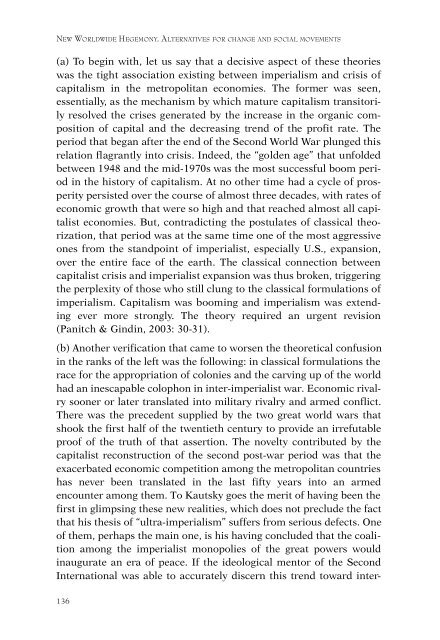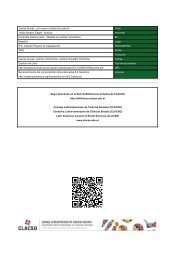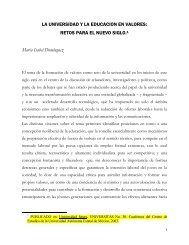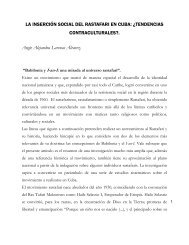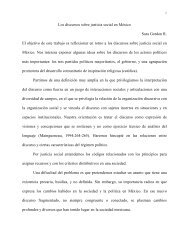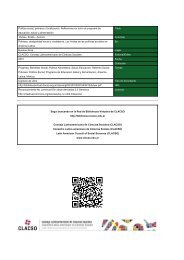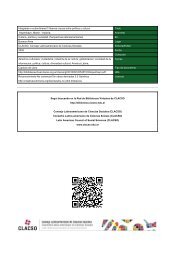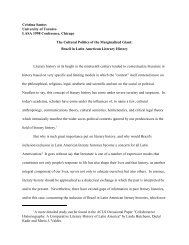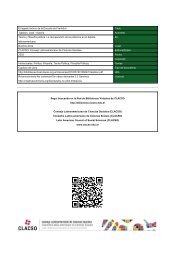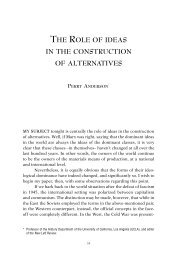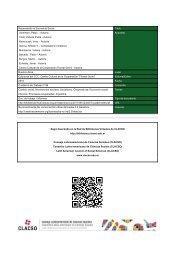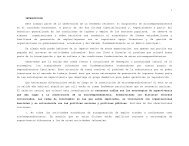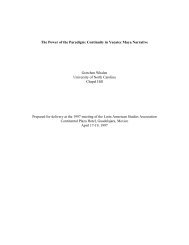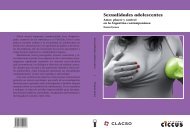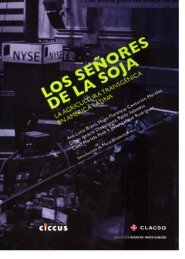hegemony and imperialism in the international system - Clacso
hegemony and imperialism in the international system - Clacso
hegemony and imperialism in the international system - Clacso
Create successful ePaper yourself
Turn your PDF publications into a flip-book with our unique Google optimized e-Paper software.
NEW WORLDWIDE HEGEMONY. ALTERNATIVES FOR CHANGE AND SOCIAL MOVEMENTS<br />
(a) To beg<strong>in</strong> with, let us say that a decisive aspect of <strong>the</strong>se <strong>the</strong>ories<br />
was <strong>the</strong> tight association exist<strong>in</strong>g between <strong>imperialism</strong> <strong>and</strong> crisis of<br />
capitalism <strong>in</strong> <strong>the</strong> metropolitan economies. The former was seen,<br />
e s s e n t i a l l y, as <strong>the</strong> mechanism by which mature capitalism transitorily<br />
resolved <strong>the</strong> crises generated by <strong>the</strong> <strong>in</strong>crease <strong>in</strong> <strong>the</strong> organic composition<br />
of capital <strong>and</strong> <strong>the</strong> decreas<strong>in</strong>g trend of <strong>the</strong> profit rate. The<br />
period that began after <strong>the</strong> end of <strong>the</strong> Second World War plunged this<br />
relation flagrantly <strong>in</strong>to crisis. Indeed, <strong>the</strong> “golden age” that unfolded<br />
between 1948 <strong>and</strong> <strong>the</strong> mid-1970s was <strong>the</strong> most successful boom period<br />
<strong>in</strong> <strong>the</strong> history of capitalism. At no o<strong>the</strong>r time had a cycle of prosperity<br />
persisted over <strong>the</strong> course of almost three decades, with rates of<br />
economic growth that were so high <strong>and</strong> that reached almost all capitalist<br />
economies. But, contradict<strong>in</strong>g <strong>the</strong> postulates of classical <strong>the</strong>orization,<br />
that period was at <strong>the</strong> same time one of <strong>the</strong> most aggressive<br />
ones from <strong>the</strong> st<strong>and</strong>po<strong>in</strong>t of imperialist, especially U.S., expansion,<br />
over <strong>the</strong> entire face of <strong>the</strong> earth. The classical connection between<br />
capitalist crisis <strong>and</strong> imperialist expansion was thus broken, trigger<strong>in</strong>g<br />
<strong>the</strong> perplexity of those who still clung to <strong>the</strong> classical formulations of<br />
<strong>imperialism</strong>. Capitalism was boom<strong>in</strong>g <strong>and</strong> <strong>imperialism</strong> was extend<strong>in</strong>g<br />
ever more strongly. The <strong>the</strong>ory required an urgent revision<br />
(Panitch & G<strong>in</strong>d<strong>in</strong>, 2003: 30-31).<br />
(b) Ano<strong>the</strong>r verification that came to worsen <strong>the</strong> <strong>the</strong>oretical confusion<br />
<strong>in</strong> <strong>the</strong> ranks of <strong>the</strong> left was <strong>the</strong> follow<strong>in</strong>g: <strong>in</strong> classical formulations <strong>the</strong><br />
race for <strong>the</strong> appropriation of colonies <strong>and</strong> <strong>the</strong> carv<strong>in</strong>g up of <strong>the</strong> world<br />
had an <strong>in</strong>escapable colophon <strong>in</strong> <strong>in</strong>ter-imperialist war. Economic rivalry<br />
sooner or later translated <strong>in</strong>to military rivalry <strong>and</strong> armed conflict.<br />
There was <strong>the</strong> precedent supplied by <strong>the</strong> two great world wars that<br />
shook <strong>the</strong> first half of <strong>the</strong> twentieth century to provide an irrefutable<br />
proof of <strong>the</strong> truth of that assertion. The novelty contributed by <strong>the</strong><br />
capitalist reconstruction of <strong>the</strong> second post-war period was that <strong>the</strong><br />
exacerbated economic competition among <strong>the</strong> metropolitan countries<br />
has never been translated <strong>in</strong> <strong>the</strong> last fifty years <strong>in</strong>to an armed<br />
encounter among <strong>the</strong>m. To Kautsky goes <strong>the</strong> merit of hav<strong>in</strong>g been <strong>the</strong><br />
first <strong>in</strong> glimps<strong>in</strong>g <strong>the</strong>se new realities, which does not preclude <strong>the</strong> fact<br />
that his <strong>the</strong>sis of “ultra-<strong>imperialism</strong>” suffers from serious defects. One<br />
of <strong>the</strong>m, perhaps <strong>the</strong> ma<strong>in</strong> one, is his hav<strong>in</strong>g concluded that <strong>the</strong> coalition<br />
among <strong>the</strong> imperialist monopolies of <strong>the</strong> great powers would<br />
<strong>in</strong>augurate an era of peace. If <strong>the</strong> ideological mentor of <strong>the</strong> Second<br />
International was able to accurately discern this trend toward <strong>in</strong>ter-<br />
136


